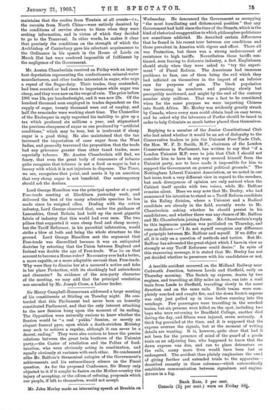Mr. Austen Chamberlain received on Friday week an impor- tant
deputation representing the confectioners, mineral-water manufacturers, and other trades interested in sugar, who urge a repeal of the Sugar-duty. Their trades, they contended, had been created or had risen to importance while sugar was cheap, and they were now on the verge of ruin. The price before 1901 was 13s. per hundredweight, and it was now 23s. Of the hundred thousand men employed in trades dependent on the supply of sugar, twenty thousand were out of employ, and half the remainder were working short time. The Chancellor of the Exchequer in reply regretted his inability to give up a tax which produced six millions a year, and stigmatised the previous cheapness of sugar as one produced by " artificial conditions," which may be true, but is irrelevant if cheap sugar is a good thing. He also maintained that the tax increased the importation of cane sugar from the West Indies, and generally traversed the proposition that the trade had any grievance greater than other taxed trades, more especially tobacco. Mr. Austen Chamberlain will find, we fancy, that even the great body of consumers of tobacco quite recognise that tobacco is not a food as sugar is, but a luxury with which it is not injurious to dispense. The Times, we see, recognises that point, and meets it by an assertion that very cheap sugar is not beneficial. Our contemporary should ask the doctors.






































 Previous page
Previous page